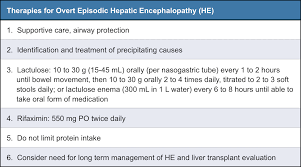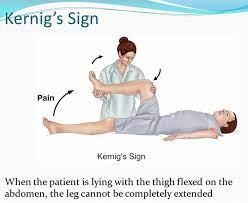The nurse is caring for a client who has ascites and hepatic encephalopathy. Which of the following prescriptions should the nurse clarify with the primary healthcare provider (PHCP)?
Rifaximin
Lactulose
Spironolactone
Alprazolam
The Correct Answer is D
Choice A rationale: Used in the management of hepatic encephalopathy by reducing the production of ammonia in the gut.
Choice B rationale: Often prescribed to reduce ammonia levels in hepatic encephalopathy by promoting bowel movements and aiding ammonia excretion. Choice C rationale: Typically used in managing ascites by reducing fluid retention and treating edema.
Choice D rationale: This medication can potentially worsen hepatic encephalopathy due to its sedative effects and impact on mental function. It's crucial to clarify its use in a patient with hepatic encephalopathy.

Nursing Test Bank
Naxlex Comprehensive Predictor Exams
Related Questions
Correct Answer is B
Explanation
Choice A rationale: Rotating the neck to one side while observing the eyes moving to the opposite side is a procedure for testing for oculocephalic reflex or doll's eye
phenomenon, which indicates brainstem function.
Choice B rationale: This is the correct answer. Kernig's sign is a clinical sign that indicates meningitis, which is an inflammation of the membranes that cover the brain and spinal cord. To test for Kernig's sign, the nurse should flex the patient's hip to 90 degrees and then attempt to extend the knee. A positive Kernig's sign is when the patient
experiences pain in the lower back or hamstring, resists knee extension, or involuntarily flexes the opposite leg.
Choice C rationale: Stroking the lateral aspect of the sole of the patient's foot and observing for dorsiflexion of the big toe is a procedure for testing for Babinski's sign, which indicates upper motor neuron lesion or damage.
Choice D rationale: Passively flexing the patient's neck forward and observing for hip and knee flexion is a procedure for testing for Brudzinski's sign, which also indicates meningitis.
 |
Correct Answer is A
Explanation
Choice A rationale: candidiasis - The described symptoms of inflammation, cottage
cheese-like discharge, and vaginal/vulvar inflammation are indicative of a yeast infection or candidiasis.
Choice B rationale: Chlamydia - Chlamydia often presents with different symptoms such as discharge, but it's not typically associated with a cottage cheese-like appearance.
Choice C rationale: bacterial vaginosis - Bacterial vaginosis typically presents with a different type of discharge, often described as "fishy" smelling, rather than a cottage cheese appearance.
Choice D rationale: trichomoniasis - Symptoms of trichomoniasis usually include frothy, malodorous discharge, not consistent with the described cottage cheese-like discharge.
Whether you are a student looking to ace your exams or a practicing nurse seeking to enhance your expertise , our nursing education contents will empower you with the confidence and competence to make a difference in the lives of patients and become a respected leader in the healthcare field.
Visit Naxlex, invest in your future and unlock endless possibilities with our unparalleled nursing education contents today
Report Wrong Answer on the Current Question
Do you disagree with the answer? If yes, what is your expected answer? Explain.
Kindly be descriptive with the issue you are facing.
